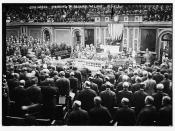The Telecom Act: Beyond the Hype
Politics is the art of the possible. By that standard, Congress deserves a pat on the back for passing the Telecommunications Act, after many years of trying. The new law is a step in the right direction. But it is not the deregulatory revolution that the victory bulletins emanating from Washington proclaim. This view is steeped in the belief that reality in the information sector is shaped by Washington legislation rather than the other way around. According to an article written by Joseph Nacchio, CEO of Qwest Industries titled, Communications Acquisitions, he stated, " Much of what the law claims to accomplish has been happening anyway. Take competition in local telephone service, the keystone of the Act. The fact is that local telephone competition has already been instituted around the country by most important states, and with many of the other states well on the way to doing so, too.
The new Act merely extends this kind of competition to the slower-moving states. "(Nacchio, 2000, pg 4)
With local phone competition already on its way, the end of the restrictions of the AT&T divestiture decree on the Baby Bell companies was in sight, too. Without a monopoly bottleneck, and with safeguards similar to those now set by the Act, these phone companies would have been let into long distance, video, and full-service provision -- Act or no Act. "The Baby Bell companies like to believe that the new laws provide for greater speed and certainty by setting deadlines. But they will find themselves disappointed: their rivals will tie them up for years in courts and regulatory commissions, arguing that they have not met the elaborate check-list of pro-competitive steps. Because each state must certify that its Bell Company has met all conditions, it will...


